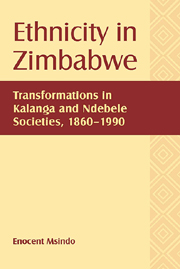Book contents
- Frontmatter
- Contents
- List of Illustrations
- Acknowledgments
- List of Abbreviations
- Note to the Reader
- Introduction
- 1 Ethnicity and Identities in Matabeleland
- 2 Domination and Resistance: Precolonial Ndebele and Kalanga Relations, 1860–93
- 3 Remaking Communities on the Margins: Chieftaincy and Ethnicity in Bulilima-Mangwe, 1893 to the 1950s
- 4 Ultraroyalism, King's Cattle, and Postconquest Politics among the Ndebele, 1893 to the 1940s
- 5 Language and Ethnicity in Matabeleland
- 6 Contests and Identities in Town: Bulawayo before 1960
- 7 Complementary or Competing? Ethnicity and Nationalism in Matabeleland, 1950–79
- 8 Postcolonial Terror: Politics, Violence, and Identity, 1980–90
- Conclusion
- Notes
- Selected Bibliography
- Index
- Rochester Studies in African History and the Diaspora
4 - Ultraroyalism, King's Cattle, and Postconquest Politics among the Ndebele, 1893 to the 1940s
Published online by Cambridge University Press: 05 February 2013
- Frontmatter
- Contents
- List of Illustrations
- Acknowledgments
- List of Abbreviations
- Note to the Reader
- Introduction
- 1 Ethnicity and Identities in Matabeleland
- 2 Domination and Resistance: Precolonial Ndebele and Kalanga Relations, 1860–93
- 3 Remaking Communities on the Margins: Chieftaincy and Ethnicity in Bulilima-Mangwe, 1893 to the 1950s
- 4 Ultraroyalism, King's Cattle, and Postconquest Politics among the Ndebele, 1893 to the 1940s
- 5 Language and Ethnicity in Matabeleland
- 6 Contests and Identities in Town: Bulawayo before 1960
- 7 Complementary or Competing? Ethnicity and Nationalism in Matabeleland, 1950–79
- 8 Postcolonial Terror: Politics, Violence, and Identity, 1980–90
- Conclusion
- Notes
- Selected Bibliography
- Index
- Rochester Studies in African History and the Diaspora
Summary
Political Authority, Ethnic Rights, and the Ndebele Legacy
Having just examined the postconquest situation in Bulilima-Mangwe in the preceding chapter, which raised critical issues about the creation of identities on the margins of the colonial state, it is important that we also examine the issue of who speaks for the Ndebele “tribe” and the source of political authority among the Ndebele after the demise of the kingdom. This is another neglected issue in Matabeleland history that will yield important ideas about the contested nature of Ndebele identity. Taken together with chapter 3, this chapter helps us understand salient aspects of ethnicity, politics, and struggles in rural Matabeleland from colonization to the late 1940s.
Related to the question of who speaks for the Ndebele is the broader question of the source of political authority. Ndebele royals and most chiefs who were closely allied to the nineteenth-century Ndebele monarchy posed, in the early colonial period, as living heroes. Their move to restore the Ndebele monarchy—feared and obstructed by the colonial rulers—solidified the already existing division between commoners and remnants of the Ndebele ruling class. It represented another extreme reaction, one not expected by the colonizer, who thought that the Ndebele had been placated enough by the elevation of some of their chiefs into head chiefs and also by the payment of allowances for the upkeep of the Lobengula family. The“restoration movement, which is still an issue in Matabeleland today, aroused debates about the commoners' freedom and status should the aims of the ultraroyalists be achieved.
- Type
- Chapter
- Information
- Ethnicity in ZimbabweTransformations in Kalanga and Ndebele Societies, 1860-1990, pp. 93 - 114Publisher: Boydell & BrewerPrint publication year: 2012

